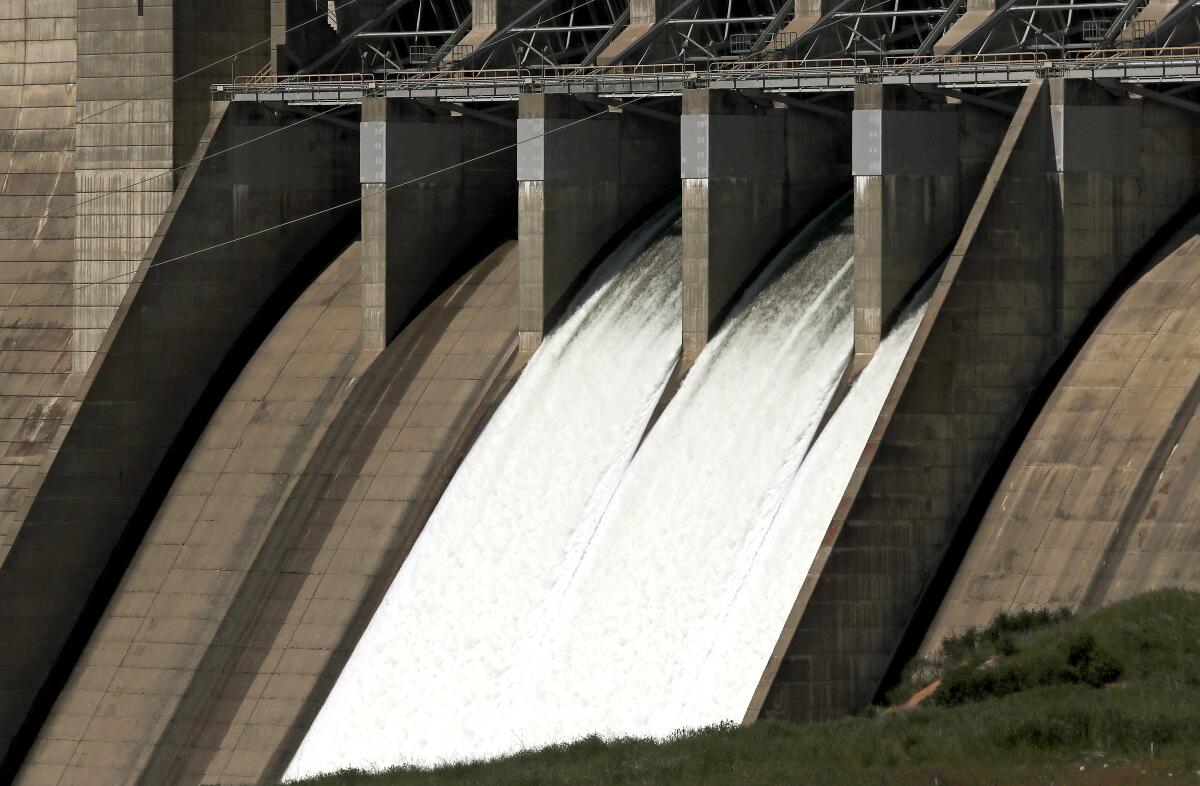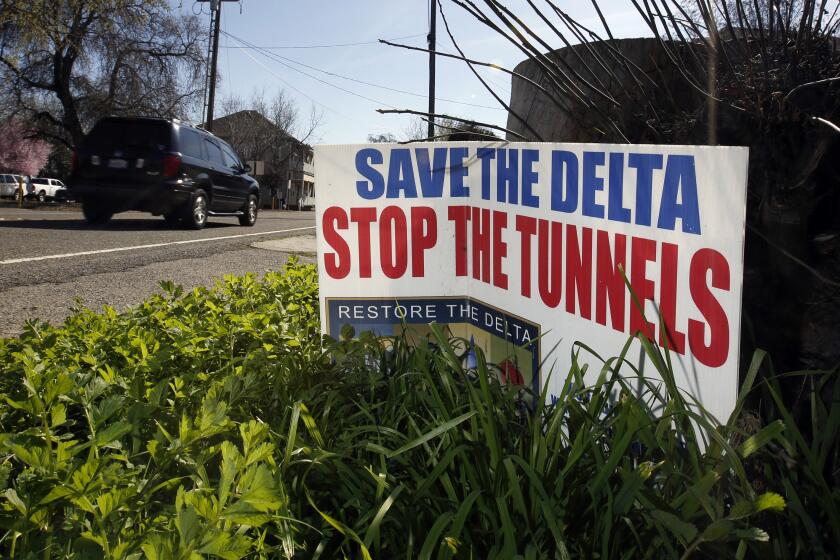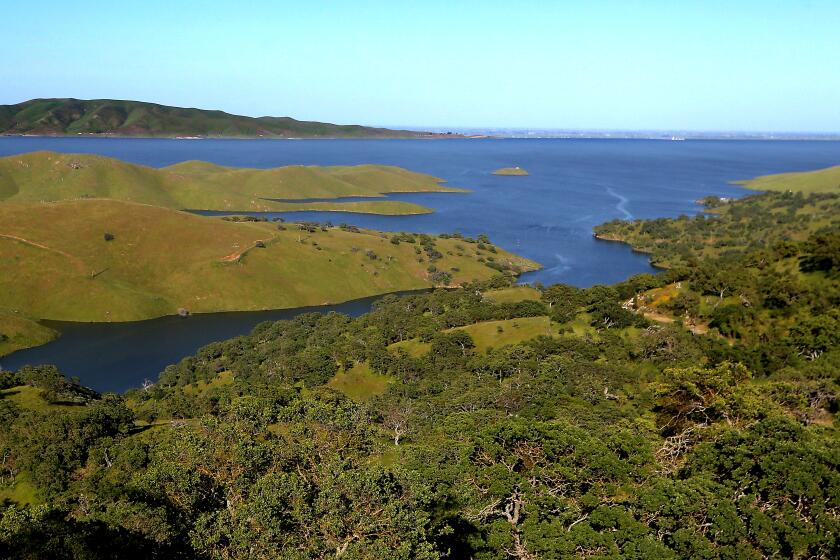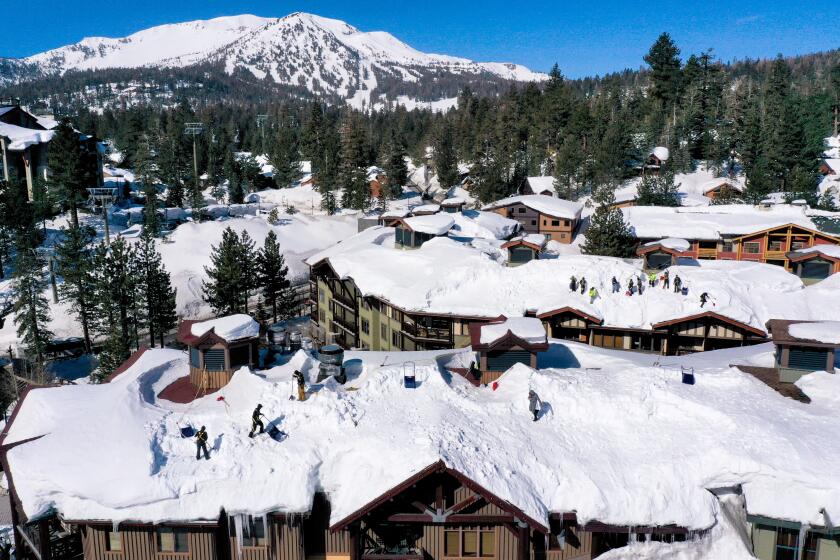Audit finds California water agency not adequately considering climate change in forecasts

- Share via
The state auditor has issued a report strongly criticizing the California Department of Water Resources, saying the agency has overestimated the state’s water supply during drought and continues relying on forecasts that don’t adequately factor in the effects of climate change.
The report by State Auditor Grant Parks said the Department of Water Resources has “made only limited progress” in improving its water-supply forecasts to account for climate change, despite acknowledging more than a decade ago that it needed to improve its forecasting methods.
The audit also concluded that DWR “has not developed a comprehensive, long-term plan” for the State Water Project, the system that delivers water from Northern California to Southern California and supplies almost 27 million Californians, to proactively respond to more severe droughts.
The auditor said that in 2021, amid the driest three-year period on record, DWR significantly overestimated the state’s water supply. In February of that year, the report said, the department projected that runoff would be at least twice the volume that actually flowed in the majority of the watersheds that are included in forecasts.
“DWR has continued to rely heavily on historical climate data when developing its forecasts,” the auditor said in the report. “DWR has since begun planning to adapt its forecasting model and associated procedures, but it could better ensure that it is using the best approach available if it adopted a formal process for evaluating the quality of its forecasts.”
A California water advocacy group is criticizing Gov. Gavin Newsom’s proposed Delta Conveyance Project, saying it would be a fiscal disaster.
The audit found that significant errors in runoff forecasts can cause problems for other water agencies. For example, it said that in 2021 the department’s overestimate of inflow into Folsom Lake meant that El Dorado Irrigation District “had to forego diverting water into storage that it would have otherwise been able to capture in its reservoir.”
The report noted that California endured the driest three-year period on record from 2020 through 2022, followed this year by heavy rain, snow and flooding. It pointed out that scientists project global warming will cause more extreme fluctuations in severe weather, including prolonged drought.
The state auditor found that in contrast to the Department of Water Resources, some local and federal agencies “use forecasting models that leverage additional data that may allow them to better account for the changing climate and its effects on the water supply.” It said some of the agencies that incorporate additional data in this way include Turlock Irrigation District, the San Francisco Public Utilities Commission, Merced Irrigation District and the California Nevada River Forecast Center.
The audit also found that DWR lacks sufficient records explaining some of its water releases from Lake Oroville, the state’s second-largest reservoir, and has at times released more water into the Sacramento-San Joaquin River Delta than required under existing flow standards.
State and federal officials expect to deliver 100% of requested water supplies to communities across California, as reservoirs fill with epic snowmelt.
The report said the agency “lacks a formal process for periodically evaluating certain State Water Project operations to identify opportunities for improvement.”
Among the audit’s recommendations, the report said the department should:
- Start to evaluate the accuracy of its monthly forecasts on an annual basis, including an assessment of whether actual runoff matched the range of scenarios.
- Follow through on a plan to adopt an updated water-supply forecasting model to better account for the effects of climate change.
- Develop a long-term plan for mitigating and responding to the effects of drought on the State Water Project.
- Establish procedures to determine monthly and annual plans for operating the State Water Project, including the amount of water that will be held in dams and released.
- Reevaluate the data the agency relies on in planning reservoir operations at Lake Oroville.
The Department of Water Resources disagreed with the report’s main findings.
“DWR has been actively engaged in climate change adaptation since 2008, and we respectfully disagree with the audit’s assertion that DWR has been slow in addressing the impacts of climate change,” Karla Nemeth, the department’s director, said in an email.
Nemeth said the conditions in spring 2021 “were extreme and outside the bounds of historical experience.”
“DWR reacted quickly to the extreme hydrology and recognized the runoff forecasting error of 2021 as an opportunity to learn, adjust, and improve,” Nemeth said. “Conditions like those experienced in 2021 speak to the importance of forward-looking forecasting and developing new tools for an era of extremes.”
In a letter responding to the audit, Nemeth said DWR established a climate change program in 2008 and has since released five updates of its climate plan.
“While there is always more that DWR can do to adapt to a changed climate, DWR has demonstrated leadership in accounting for the effects of climate change,” she said in the letter.
“Many of the audit report recommendations would layer additional processes and procedures on reservoir operations,” Nemeth wrote. “No amount of paperwork will solve the challenges of climate change. However, a collaborative team of scientists, academic partners, and water managers dedicated to improved forecasting and water management through extreme flood and drought will help keep Californians safe, with secure water supplies, and that is DWR’s approach.”
Flying over the Sierra Nevada, teams are using lasers to measure California’s vast snowpack, tracking flood risks as the snow melts.
State Sen. Melissa Hurtado, a Democrat whose district includes parts of the San Joaquin Valley, said she’s concerned about poor data and mismanagement of water supplies, and the report helps identify issues that need to be addressed.
“I think that the auditor is spot on,” Hurtado said. “The Department of Water Resources needs to take the recommendations from the state auditor.”
Hurtado has introduced a bill that would require state agencies to update a report on the feasibility and costs of a coordinated water measurement database, which she says would ensure water-supply forecasts are based on accurate data.
Hurtado said DWR needs to “break free from a reliance on outdated data to ensure proper water allotments.“
The report validates criticisms that environmental groups have raised for years about the agency’s “failure to proactively plan for droughts and failure to adequately account for the effects of climate change,” said Doug Obegi, director of the California river restoration program for the Natural Resources Defense Council.
“The report should be a wake-up call that leads DWR to make significant changes in how they estimate runoff from snowpack and storms,” he said, “and in developing a proactive plan for droughts, rather than simply waiving environmental protections and sacrificing salmon and other native fish and wildlife during droughts.
“Yet instead of admitting that there is a problem and working to fix it,” Obegi said, “DWR rejects the report’s findings and believes these recommendations will just lead to more ‘paperwork.’”










